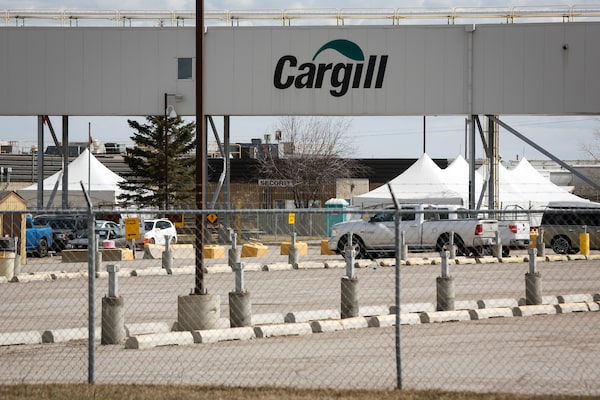
Cargill announced a temporary shut down of its beef plant near High River where officials in the area are dealing with over 400 cases of COVID-19 linked to the plant, including the death of a worker, in High River, Alta., on April 23, 2020.Jeff McIntosh/The Canadian Press
Bronwyn Bragg is a PhD candidate in human geography at the University of British Columbia. She lives and works in Calgary.
The 500 confirmed cases of COVID-19 and one death tied to an Albertan meat-packing plant are unquestionably tragic. The Cargill plant in High River, Alta., temporarily ceased operations last week after the most serious COVID-19 outbreak in Canada, with cases linked to that plant constituting about a quarter of all cases in the province.
But it must also be understood in its broader context, beyond this pandemic. While this tragedy seems unique to this crisis, this outbreak has only exposed Canada and Alberta’s dependence on temporary labour migration and immigrant workers, the particular vulnerabilities they face, and the deep inequities in Canada’s occupational health and safety system.
Media reports and accounts from community advocates have indicated that most workers at the meat-packing plant came here from abroad, many as temporary foreign workers. This is in line with what the Canadian Centre for Policy Alternatives recently found: that workers who have been deemed “essential” are also disproportionately racialized. Immigrant workers earn less than the Canadian average and lack access to basic protections, including paid sick leave. These workers are systematically disadvantaged with respect to workplace safety, despite the rights due to them under the Employment Standards and the Occupational Health and Safety acts.
The current OHS system relies on the “internal responsibility system,” which means it is driven by complaints and thus requires that workers have to be the one to assert their rights to workplace safety. This system disadvantages low-wage and precarious immigrant workers, who may be unable to exercise these rights or fear reprisal for speaking out about unsafe work conditions. This is borne out in data which show that, in their first five years in Canada, immigrant men are at increased risk of work-related injuries that require medical attention, compared with their Canadian-born counterparts.
The crisis has also revealed the way public policy intersects with an unequal labour market to exacerbate those vulnerabilities that temporary workers in particular face. While policies around temporary foreign workers change depending on prevailing political sentiments and public attitudes, the fundamentals of the program remain largely unchanged: Workers are recruited for labour that Canadians are unwilling to do.
Much of it, including meat-packing, is “3D work” – difficult, dangerous and dirty. Research published in 2014 found that in Alberta, meat-packing employees have the highest probability of a disabling injury of all manufacturing employees, at a rate that is more than double the manufacturing average.
Temporary workers enter Canada on a time-limited work permit that is tied to their employer. The program is divided by skill level: Those in “high-skill” occupations have greater access to Canadian permanent residence than “low-skill” workers, including meat packers. What few pathways exist are largely dependent on a referral from employers, making it less likely for those workers to push for their rights.
Temporary migrant workers in occupations classified as low-skilled are structurally disadvantaged when it comes to workplace health and safety. They pay taxes and contribute to the employment insurance program, but if they become sick or injured, they can be laid off and sent back to their home country without access to the Canadian benefit system. Research shows that temporary migrant workers hide illnesses and injury for fear of being fired, and we cannot rule out that this influenced the Cargill workers who continued to do their job despite being sick.
It is deeply unjust that workers deemed “essential” in this pandemic are the same workers who are unable to access pathways to Canadian citizenship, and to equitable workplace health and safety. The temporary foreign worker program is meant to address short-term and geographically specific needs in the labour market, yet as advocates and researchers have noted for years, “temporary” migrant workers often work in jobs that are not temporary at all.
As evidence of the inequities in workplace safety, the last inspection at the Cargill plant happened over video rather than through an in-person inspection. This raises important questions about the actual safety afforded to those working in the plant. Workers have disclosed to the media that their concerns over safety and the coronavirus that causes COVID-19 went largely unheeded by management.
And yet, Alberta designated Cargill an essential service. That only ensured that one of the largest and most profitable companies in the world continued operations – while workers suffered the consequences.
Keep your Opinions sharp and informed. Get the Opinion newsletter. Sign up today.